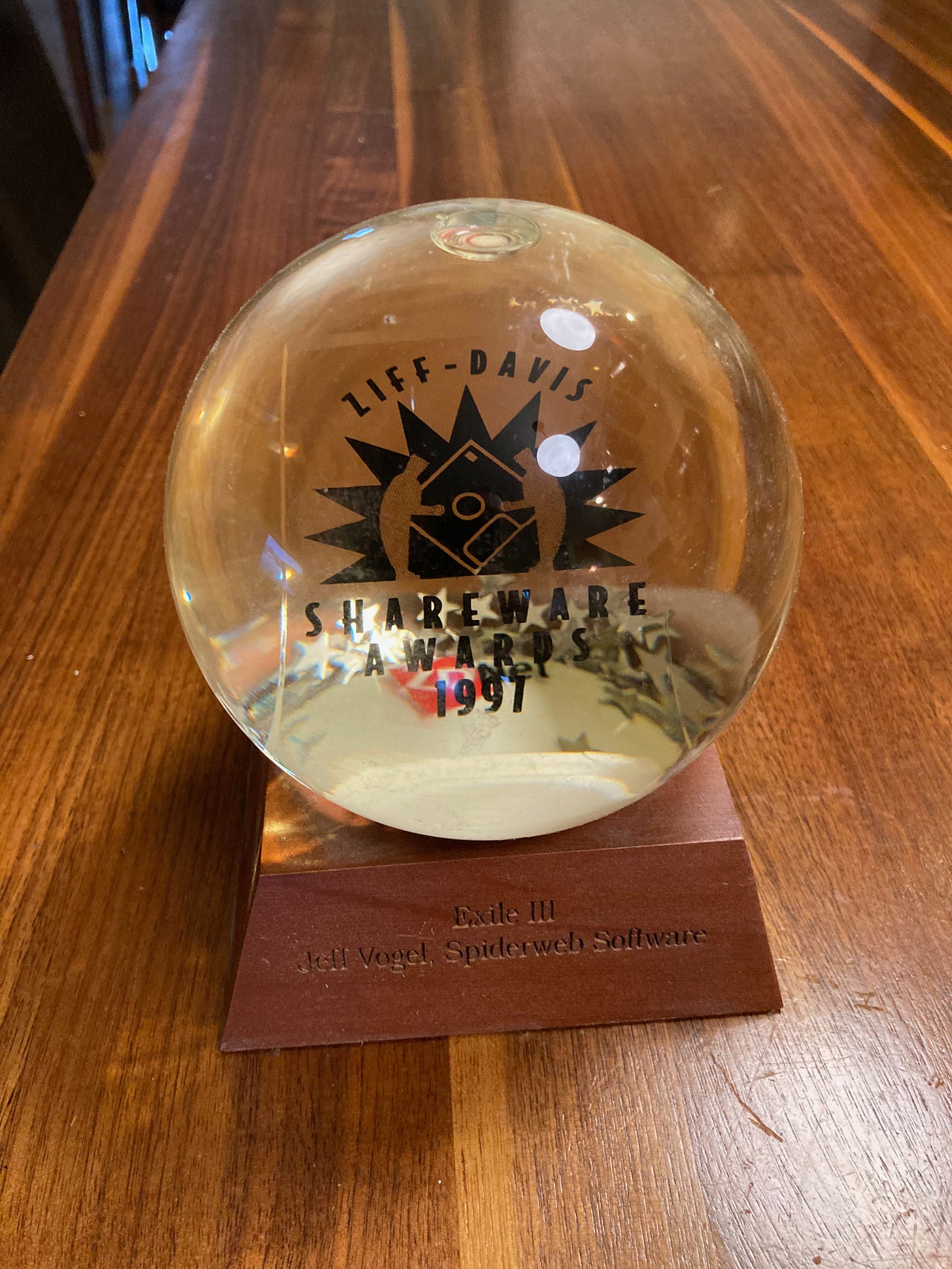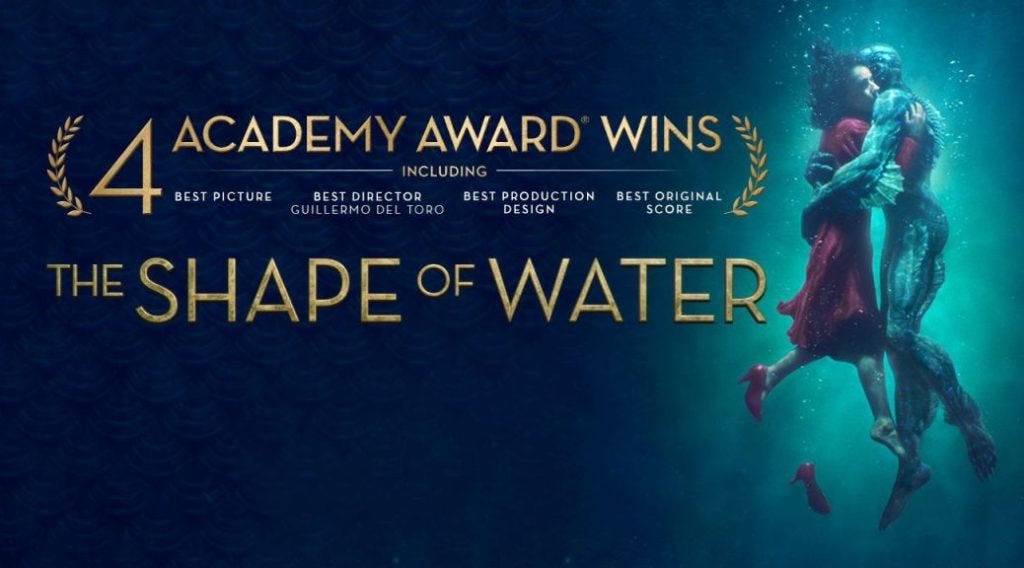Award Shows and Other Human Things
Trivial and silly can be great, if it's the right sort of trivial and silly.

I've always loved award shows.
I like getting in on big, cultural events. I also throw Super Bowl parties. It’s more fun to like things than not like things.
Awards are a silly, meaningless thing to love. Turning the glorious world of art into a tacky competition? It's silly. But it is also fun. And if I, a game designer, can't enjoy fun, what am I even doing here?
It's fun to argue about the awards. It's fun to complain about the broadcasts. It's fun to argue about the rules for the shows. It's fun to argue about if the shows should even exist. And, of course, all these arguments are utterly, safely meaningless. Which only adds to the fun.
Not long ago, I wrote an article about how terrible one of the game industry's award shows, The Game Awards is. And it is terrible. It's not terrible because of the awards it gives. It's terrible because it doesn't do what an awards show needs to do to function as an award show.
So what are awards for, anyway?

I Mean, Obviously, Award Shows Are Dumb
There is nothing in the world more subjective than art. Any organization trying to say "This is the best movie of the year!" is on a fool's errand. It's an impossible task.
Or, to put in another way, if you look at the movies who’ve won the Best Picture Oscar, there's a lot of mediocre stuff in there. Or just plain bad.
But doing something silly and impossible is freeing, in a way. It means you don't have to worry about coming up with a right answer. Instead, you can focus on giving people what they NEED.
Why Have Awards?
It's a human thing. Awards serve a number of human needs.
They give us a chance to celebrate those among us who have excelled. Almost every year, an Oscar goes to someone who didn't create the best work, but who has had an amazing career that has not been recognized. (Great example: Martin Scorsese, the greatest living filmmaker, finally winning Best Picture for The Departed.) It's a chance for kindness and appreciation, which are always valuable.
Awards gives us a chance to reflect on the year that just passed, good and bad. It is a good thing to occasionally stop, take stock, and ask, "What have we been doing? What did it mean?"
When you argue about what should have won an award, you are remembering all the good things humans achieved over the previous year. When someone says, "It's an honor just to be nominated," that's actually true! You have been remembered and appreciated. Whether you get the tacky statue or not is just ego crap.
Awards give us a chance to send a message to the future about what was most important to us at the time. What we enjoyed, what we valued. Then the future can judge us.
In an increasingly atomized culture, they let us take part in a large, shared experience.
Awards provide the future with a pretty good recommendation list of things to enjoy. Flawed, of course, but a good place to start.
And, of course, the shows themselves give us a night to relax and have dumb fun. That is always important.

It'd Be Nice For Video Games To Have Something Like That
But we don't.
What does it take to have a good award show? Scale, and respectability. They need to be given by an organization which is large enough to attract attention, and thoughtful and respectable enough that people will take its opinions seriously.
Awards are silly, of course. However, to work, they need to be a very rigorous and self-serious sort of silly.
They should be voted on by professionals. People who really understand the art form and are familiar with all of the works in contention. Popularity contests are nice, but they don't have the gravitas necessary for people to care.
The awards should be administered by an organization that manages the awards, makes the criterion by which voters are selected, selects the voters, and administers the process. These are big, expensive jobs. Someone has to step forward and pay for it. This all has to be done in a visible and well-explained way, so that the awards have enough respectability to be the right sort of silly.
Then the awards need to be given in a show that can maintain the delicate balance between respecting the award and the art form, and making money putting the show on.
This is a LOT. It takes passion, patience, and time, in a mercenary industry that burns out most people in it before they're thirty. I'm not sure it will happen in my lifetime, if ever.
Thus, video games will either get tiresome infomercials like The Game Awards or a host of tiny awards hardly anyone notices. Maybe one of those will grow. I hope.
Or maybe it shouldn't ever happen. For an award show to work requires a serious, dignified sort of silly. Feral fourteen-year-old boy silly doesn't work. I'm not sure video games can (or even should) manage it.

And Anyway These Shows Are a Thing of the Past
Ratings of award shows have been plummeting like dropped stones for years, and there's no sign of that reversing. Maybe they're just obsolete. Whatever secret sauce made people care doesn't exist in young people. Maybe the other entertainment options on the night of the Emmys are just better.
Things change. That's just life. The awards will still continue as industry affairs, smaller and humbler, taking place in less expensive halls, but still around if we ever need that sort of distraction again.
At least the Super Bowl just had its biggest ratings. Maybe the problem with The Oscars is that Taylor Swift doesn't make out with someone at the end of it.
Since the Oscars Are Coming Up
A few words about that.
The King of Award Shows has been on a long slow decline for many a year. A lot of the problem: The movies that most people see aren't the best ones.
If you liked the live action Lion King or Furious 7 or Frozen 2, hey, that's great. And the studios who made them were rewarded well. With giant piles of money.
But Best Picture? No. I liked Avatar 2 a lot, but I'm not watching any show that pretends it was the best movie of its year. James Cameron wants a reward for making it? Fine. As Don Draper said, that's what the money is for.
However, nobody wants (or should want) to watch awards being fought over movies they never even heard of.
It's quite a pickle.
The Oscars tried to increase appeal by having Best Picture have up to 10 nominees, so that some big blockbusters could be nominated and lose. I could have told them this was a bad idea. It just means the nominees wind up being 10 movies most people never heard of.
It also alienates people who actually do go see artsy movies (like me) because it becomes very, very difficult to see all the nominees.
The Oscars had to try something to halt the decline. Alas, the problem is impossible. Oh well. The Oscars can decline into a small industry award until people find a reason to care again.
And that's it for award shows. The Oscars are soon. I really hope Killers of the Flower Moon cleans up. I'll find out after the show is over. I mean, I'm not going to watch that crap! The show is like nine hours!
Subscribing is free, and you get all these nice posts in your in-box. If you’d like to support us, consider wishlisting our upcoming indie role-playing epic, Geneforge 2 - Infestation, out March 27.
Spiderweb Software makes fun role-playing games and also has a mailing list and a Twitter and a Facebook if you want to learn when we do something big.



I was thinking Jeff Vogel was gonna launch a brand new game award show. The article seemed to be leaning that way. ;)
Another potential reason for the lack of award shows for games: there are all these Top 10 videos/articles. E.g. watchmojo. They have no ceremony or authority, but there's a ton of them. Maybe they scratch the itch well enough to dampen demand for a larger thing.
It's a kind of stagflation. We get cheaper versions of things that aren't as good, but are good enough.
Would a computer game award show subjective or objective? I think that is a challenge that the Oscars, Tony's, Grammy's, etc. run into. They want to celebrate the artsy but have to contend with raw popularity.
If objective, then you have to look at the raw numbers. In how many ways did the game innovate or demonstrate best-in-class experiences? Do you go by raw sales? Even if the game is abysmal (not very fun), it may have sold a lot of copies and made a lot of money. Do you go by volume of content? Some games have huge amounts of text, hours of spoken dialog, hours of orchestral music, SSD-busting quantities of artwork.
If subjective, then it's entirely on the whim of the emotional impact on those who felt something when they played the game.
Consider that awards shows exist to make money. Your art being highlighted in an awards show either validates those who have spent money on your art, justify spending more money on future art, or is an advertisement for your art that will hopefully rake in more money.
If the latest Geneforge gets the "Best CRPG Developed by a Team of Less Than Ten Developers", then that highlights the game and you make more money! Though... then you run the risk of "award bloat" where you can have the award for "Best Tactical Puzzle Shooter with Slow-Mo Action and Cel-Shaded Polygons" (Superhot).